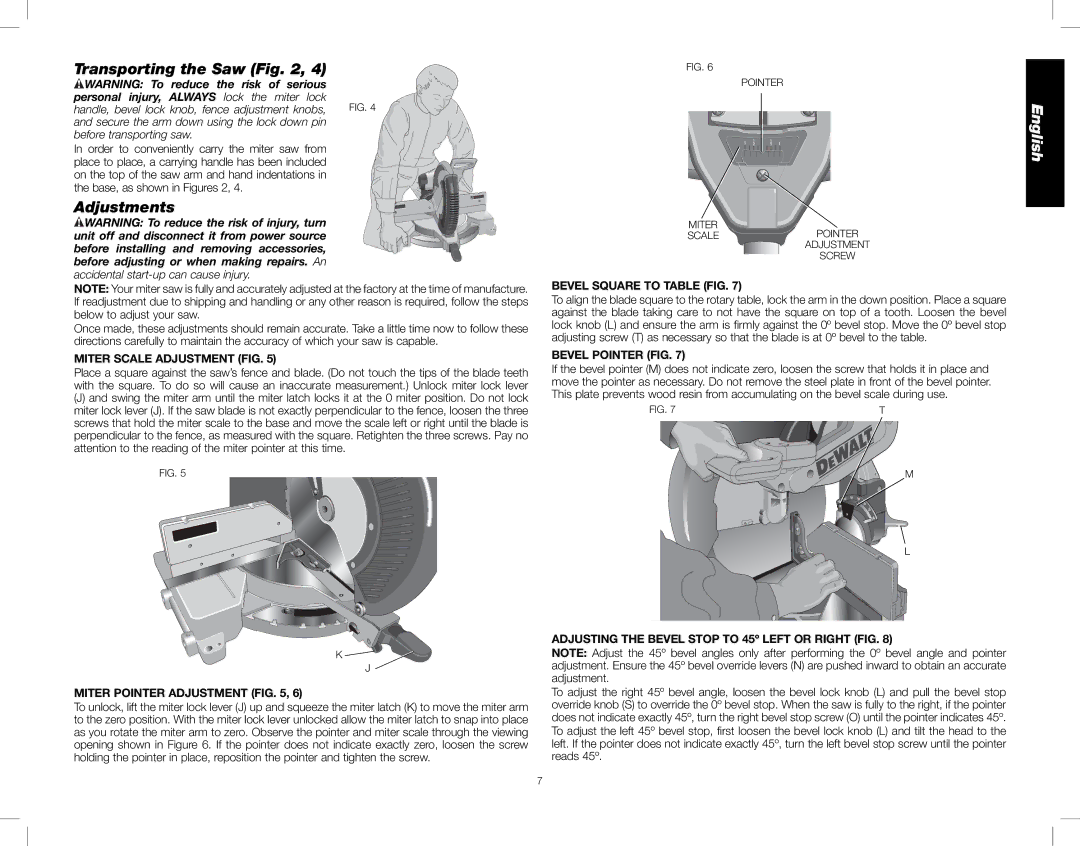
Transporting the Saw (Fig. 2, 4)
WARNING: To reduce the risk of serious |
|
personal injury, ALWAYS lock the miter lock | FIG. 4 |
handle, bevel lock knob, fence adjustment knobs, | |
and secure the arm down using the lock down pin |
|
before transporting saw. |
|
In order to conveniently carry the miter saw from |
|
place to place, a carrying handle has been included |
|
on the top of the saw arm and hand indentations in |
|
the base, as shown in Figures 2, 4. |
|
Adjustments
![]() WARNING: To reduce the risk of injury, turn unit off and disconnect it from power source before installing and removing accessories, before adjusting or when making repairs. An
WARNING: To reduce the risk of injury, turn unit off and disconnect it from power source before installing and removing accessories, before adjusting or when making repairs. An
accidental start-up can cause injury.
NOTE: Your miter saw is fully and accurately adjusted at the factory at the time of manufacture. If readjustment due to shipping and handling or any other reason is required, follow the steps below to adjust your saw.
Once made, these adjustments should remain accurate. Take a little time now to follow these directions carefully to maintain the accuracy of which your saw is capable.
MITER SCALE ADJUSTMENT (FIG. 5)
Place a square against the saw’s fence and blade. (Do not touch the tips of the blade teeth with the square. To do so will cause an inaccurate measurement.) Unlock miter lock lever
(J)and swing the miter arm until the miter latch locks it at the 0 miter position. Do not lock miter lock lever (J). If the saw blade is not exactly perpendicular to the fence, loosen the three screws that hold the miter scale to the base and move the scale left or right until the blade is perpendicular to the fence, as measured with the square. Retighten the three screws. Pay no attention to the reading of the miter pointer at this time.
FIG. 5
K ![]()
J
MITER POINTER ADJUSTMENT (FIG. 5, 6)
To unlock, lift the miter lock lever (J) up and squeeze the miter latch (K) to move the miter arm to the zero position. With the miter lock lever unlocked allow the miter latch to snap into place as you rotate the miter arm to zero. Observe the pointer and miter scale through the viewing opening shown in Figure 6. If the pointer does not indicate exactly zero, loosen the screw holding the pointer in place, reposition the pointer and tighten the screw.
FIG. 6
POINTER
MITER
SCALEPOINTER
ADJUSTMENT
SCREW
BEVEL SQUARE TO TABLE (FIG. 7)
To align the blade square to the rotary table, lock the arm in the down position. Place a square against the blade taking care to not have the square on top of a tooth. Loosen the bevel lock knob (L) and ensure the arm is firmly against the 0º bevel stop. Move the 0º bevel stop adjusting screw (T) as necessary so that the blade is at 0º bevel to the table.
BEVEL POINTER (FIG. 7)
If the bevel pointer (M) does not indicate zero, loosen the screw that holds it in place and move the pointer as necessary. Do not remove the steel plate in front of the bevel pointer. This plate prevents wood resin from accumulating on the bevel scale during use.
FIG. 7 | T |
M
L
ADJUSTING THE BEVEL STOP TO 45º LEFT OR RIGHT (FIG. 8)
NOTE: Adjust the 45º bevel angles only after performing the 0º bevel angle and pointer adjustment. Ensure the 45º bevel override levers (N) are pushed inward to obtain an accurate adjustment.
To adjust the right 45º bevel angle, loosen the bevel lock knob (L) and pull the bevel stop override knob (S) to override the 0º bevel stop. When the saw is fully to the right, if the pointer does not indicate exactly 45º, turn the right bevel stop screw (O) until the pointer indicates 45º. To adjust the left 45º bevel stop, first loosen the bevel lock knob (L) and tilt the head to the left. If the pointer does not indicate exactly 45º, turn the left bevel stop screw until the pointer reads 45º.
English
7
